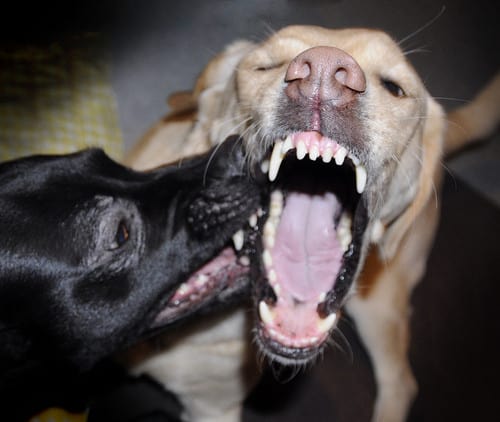Dog Bite Accident Lawyers in Chicago, IL
Willens & Baez is a top-rated law firm with an award-winning team of Chicago Personal Injury Lawyers and Dog Bite Accident Attorneys who can help you when you have been injured from a dog bite. Since we charge no legal fees, unless and until we succeed in obtaining a monetary recovery for you, you can count on us fighting hard to get you the compensation you need and deserve.
We know that an injury case has the potential to take over a person’s life, making it difficult to move forward. People turn to us for the dedicated, caring help they require, regardless of the type of accident they were in or the type of injury sustained. We want to help them take control of their situation so they can focus on what matters most — getting back on track. This is also why many of our firm’s cases are referred to us from other lawyers and law firms who trust us to handle their friends, family members and clients’ personal injury cases.
Why Let Willens & Baez handle your Chicago Dog Bite Accident?
If you were not trespassing, or provoking the dog and still got attacked, you have the right to seek compensation. Your injuries might have caused you to miss work or go through months of expensive physical therapy. You need a level of compensation that will meet all of your needs and put you on the path to recovery. The guilty party needs to be held liable for their aggressive dog. If you want to be represented by a skilled dog bite attorney in Chicago, then you need Willens & Baez. We have years of experience. We know how to deal with the legal ramifications of personal injury cases associated with dog attacks. We go to work for you.
If you are suffering from an injury caused by a dog attack, give us a call. We offer a free consultation. That’s right, our initial consultations are free. We will discuss your situation, and help you make decisions.
Call (312) 957-4166 For a Free Consultation
Need an Experienced Dog Bite Attorney?
If you or a loved one has been bitten by a dog, there might be severe and long-lasting injuries. You may need legal representation in order to get the level of compensation you need to recover fully from this ordeal.
If you are living in Chicago, you are sharing your city with a lot of animals. Though pets still don’t outnumber people, it has been estimated that there are over one million dogs in Chicago alone. Most can be considered man’s best friend. Unfortunately, there are a number of aggressive dogs that will attack and bite. Adults aren’t the only victims; children are more often mauled. If you or a loved one has been bitten by a dog, there might be severe and long-lasting injuries. You may need a Chicago dog bite lawyer in order to get the level of compensation you need to recover fully from this ordeal.
If a dog bites you what will you do?
- Get away from the dog. You may be injured, angry or afraid, but the best way to avoid further injury is to get someplace safe.
- Call the police. A detailed police report will help you when you seek recompense from the dogs’ owner.
- Seek medical attention. Your injury may require stitches. If the injury is small, you still need medical attention. Dogs don’t brush their teeth. Their mouths are teeming with harmful bacteria. Your wound will need to be thoroughly cleaned and you may need to go on a series of antibiotics.
- When the dog owner’s insurance company calls, do not speak with them. They will try to offer you a settlement far below what you need to recover.
- Call Willens & Baez and let us fight for you.
What To Do If You’ve Been Bitten by a Dog in Chicago
In Chicago, victims who are bitten by a dog have rights. You’ll want to take care of your safety first, then you’ll want to take action.
Identify the Dog

The reason you’re looking to identify the dog is that the owner will be able to tell you whether the animal has been vaccinated against rabies. If you cannot verify that the dog has been vaccinated, you’ll need to get a series of expensive, painful rabies shots – which you’ll want to avoid if at all possible.
The second very good reason to find the owner is that this is the person who may be liable for your injury. Any prior reports about this dog’s behavior will have been filed under the owner’s name and dog license, and you’ll need to know if the owner has been negligent about keeping a dangerous dog under his or her control. An experienced Chicago dog bite attorney will be able to help you find out this information.
Seek Medical Care
If your dog bite injuries are severe, naturally you should skip identifying the dog in favor of getting medical treatment as soon as possible. Any severe bleeding or tissue and muscle damage should be attended to as quickly as possible – the quicker you are seen, the more likely a doctor will be able to repair the damage. Contact first responders at 911 and tell them you’ve been bitten by a dog and need immediate attention. Be sure to tell them exactly what’s wrong – you will get a quicker response if you are bleeding severely.
If your injuries aren’t immediately severe, you still need to see medical care as soon as possible. Before you head to the doctor, wash your wound out thoroughly with soap and clean water. Apply a cold clean towel to the wound to stop bleeding. If possible, try keeping the bit area elevated above the heart. If your injury is not that severe physically, you’re primarily concerned with infection and the possibility of disease. The risk of infection is quite high with dog bites, so if your primary physician is not readily available, go to the emergency room immediately.
While you are waiting to be seen, take pictures of your injuries. If you cannot easily see the injury (if you were bitten on the back of the knee, for example), ask someone if they would be willing to take a few photographs for you before beginning to treat the area. You risk infection or further injury if you re-open a wound when you unwrap bandages, so make sure you take photos ahead of time if at all possible.
Report and Pursue
After you’ve been treated, file a bite report with the local police and Animal Care and Control. If you’ve gone through 911 to get medical attention, you’ll likely be asked by the police to fill out an animal control report in Chicago automatically; if not, you’ll need to call them yourself. Don’t wait to perform this step; it legally documents your case and will help make sure this dog doesn’t bite others. It also helps officials keep track of potentially dangerous dogs.
If you did not provoke the animal to bite you by taunting or harassing it, the dog’s owner is strictly liable for payment for your damages. This means that you don’t have to show that the dog owner was negligent in any way (such as letting the dog off a leash). All you have to show is that the dog bit you, and you suffered injury.
If you have any questions about the incident, call an experienced dog bite lawyer in Chicago. They will be able to help you figure out what your options are.
Dog Bite Injuries in Chicago
Each year, around 4.7 million people suffer dog bite injuries in the United States. One in six dog bite cases is serious enough to require medical attention.
When a dog attack or dog bite occurs, it is the owner of the dog, not the dog itself, who is responsible for it. In this post, a Chicago dog bite lawyer will discuss the legal rights of dog bite victims.
Dog Bite Laws in Illinois
Illinois law makes the owners or dogs or other animals liable for any injuries caused by their pets. Under Illinois law, “owner” is a broad term that includes anyone who harbors or keeps the dog, and anyone who allows the dog to remain on a property they occupy. In fact, owners can also include actual owners or landlords of the property, as well as the actual owner of the dog.
In Illinois, dog owners are held liable for any injuries caused by their dogs. The owner cannot claim that their dog was dangerous to save themselves from liability. Courts assume that any dog has the potential to be dangerous and cause injuries. In addition to Illinois laws, local counties and cities also have their own ordinances governing the liability of dog owners.
Using provocation as a defense
In Illinois, dog owners cannot be held liable for injuries caused by their dog, if the injured person acted to provoke the dog (intentionally or unintentionally) when the injury occurred. Provocation can include things like physically harming or simply teasing the dog. The injured person must prove that they did nothing to provoke the dog.
Owning dangerous breeds of dogs
Illinois is among the states that restrict or ban the ownership of certain breeds of dogs. For example, in North Chicago, the ownership of pit bull category of dogs is restricted and the owners are required to carry certain insurance policies and licenses to own them. While animal rights groups have been constantly contending that it is not right to term certain breeds as dangerous, pit bulls are known to cause a large percentage of serious injuries.
Recovering damages for dog bite injuries
A person’s ability to recover for injuries resulting from a dog bite is dependent on where the attack or bite occurred. Laws relating to dog bites also differ across states and counties. In most cases, the plaintiff will bring a lawsuit against the dog owner, but in some cases, a third party may also be involved. The plaintiff in a dog bite case may be able to recover for physical injuries, emotional distress, mental anxiety and fear depending on the severity of the injuries and other circumstances surrounding the case.
Lawyers Who Handle Dog Bite Cases
An estimated 44 percent of Americans own dogs and of those who don’t own dogs, 70 percent consider themselves a “dog person”.
There’s a reason dogs have been called our best friends. Dogs are bright, loving, and are loyal companions. I personally don’t own a dog (unlike Matthew Willens who adores his boxer) but I would definitely consider myself a dog person. What happens though when our best friends turn on us?
Bad dog!
According to the Centers for Disease Control and Prevention, about 4.5 million people are bitten by dogs each year. Of those, almost a million require medical attention for dog-bite-related injuries. Children are especially vulnerable and account for close to 500,000 of those who receive medical attention as a result of a dog bite each year. So while dogs are incredible animals, they certainly are capable, whether intentionally or not, of causing some serious injuries. It is important that you seek immediate medical attention when faced with injuries because of a dog bite. It is also vital, if you have children, to educate them on the importance of immediately reporting any dog-bite incidents to an adult.
Even “good” dogs bite.
In the past, dog-bite victims found it difficult to receive compensation for their injuries. These victims were required to show that the “animal had a mischievous propensity to inflict such injuries and the owner had knowledge of that propensity.” In other words, the victim needed to show that this was a bad dog and that the owner knew he was a bad dog. Since the passage of the Animal Control Act, the legislatures dropped the need to show any prior acts by a dog or even that the owner had knowledge that his dog had the potential to act in such a way.
When the dog’s owner is liable
The Animal Control Act provides that a victim may recover for their injuries when the victim was not provocative, was peaceable and had the legal right to be where they were when the injury occurred. So as long as the dog-bite victim did not provoke the incident (for example by throwing rocks at the dog) and the victim was not trespassing, then that victim should be lawfully compensated for the injuries they suffered and the expenses they incurred.











